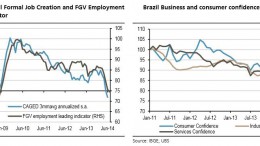UBS: Brazil’s GDP growth loses momentum
MADRID | The Corner | 2014 is not being a good year for LatAm. All countries in the region with the exception of Colombia have experienced much softer than anticipated growth. In Brazil, the political noise and uncertainty have impacted on the confidence and private activity in 1H201, with investments and private consumption leading the way down. UBS analysts see now Brazil’s real GDP growth at 0.6% in 2014 and 1.5% in 2015.






